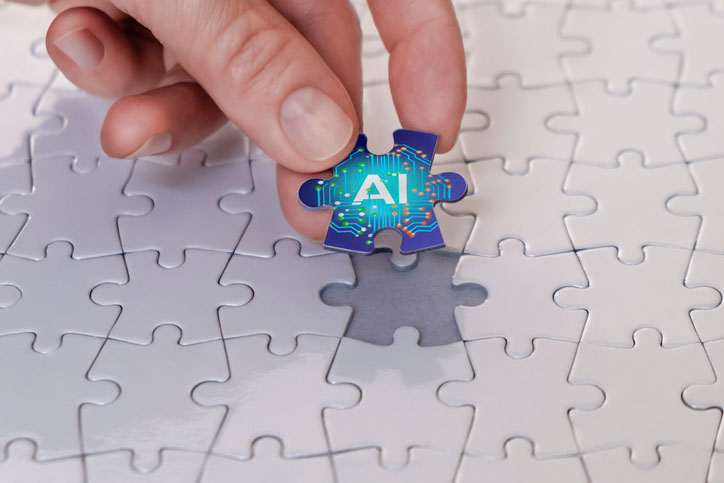Written by Scott Wilson

Ever since the first musings about machines with the intelligence and reasoning skills of men emerged around the time of the Second World War, some of the brightest minds in the world have engaged with the idea.
History remembers AI researchers:
- Alan Turing
- John McCarthy
- Marvin Minsky
- Joseph Weizenbaum
Names like Hinton and Li will be on that list before long. The idea of creating intelligence from cold silicon and electric fire is compelling to many people who are highly intelligence themselves.
Mary Shelley’s Frankenstein; or, The Modern Prometheus, was an early take on what humans creating a different kind of intelligence might look like.
It’s a profound concept. For scientists, AI intelligence may also be one of the most technologically and philosophically challenging undertakings that humanity has engaged in since the development of the atomic bomb.
It’s likely that the AI researchers behind today’s great leaps and bounds in machine intelligence will be spending eternity in the bold type of history books, too. Only the most driven, best educated, and most highly accomplished can expect to make the grade. But the world needs high-caliber AI researchers more than ever. And you can become one of them.
What Is an AI Researcher?
 Of all the jobs in the world of artificial intelligence, the position of the AI research scientist may be the easiest to explain: they are the people who invent the stuff that everyone else uses to create and program machine intelligence.
Of all the jobs in the world of artificial intelligence, the position of the AI research scientist may be the easiest to explain: they are the people who invent the stuff that everyone else uses to create and program machine intelligence.
Like any field of science and technology, it can be a lot of work just discovering the basic principles. Decades of thinking and experimentation go into figuring out essentials like:
- What works
- What doesn't
- How to optimize it
- When it shouldn't be used
- How to explain it
- Where to go next
To answer such essential questions in such a complex field, an advanced education and a curious mind are must haves.
For AI researchers, all that involves a lot of thinking, discussion, and investigation. It rests on solid foundations of math and computer science expertise. And it’s leading to new techniques, new algorithms, and new abilities that are changing the world in every country and every industry.
Avenues of Research Can Come to Define AI Researcher Jobs
 Artificial intelligence is a big tent, but there are a lot of promising niches within. While most AI jobs involve specialization to some degree or another, AI research is where those specializations are invented.
Artificial intelligence is a big tent, but there are a lot of promising niches within. While most AI jobs involve specialization to some degree or another, AI research is where those specializations are invented.
So, more than identifying researcher roles within any particular industry or application, AI scientists typically fall into various areas in which they conduct their primary research efforts. While there’s no real limit on the concepts and ideas that can be explored, the hottest AI research fields today include:
- Computer Vision
- Machine Learning
- Data Science
- Natural Language Programming
- Automation and Robotics
- Alignment and Ethics
AI research scientists often latch onto one or more of these fields while studying for their advanced degree and stick with it for much of their career. They may move from company to company, industry to industry, or back and forth between academia and government, but the depth of their experience will accumulate in a specific area of AI research.
AI Scientists Are on the Most Theoretical AI Career Track
This puts the role of AI researcher firmly on the hardcore computer science road in the AI industry today.
That’s just one of three main career tracks that are shaking out in the field. The others are:
- Business-oriented applications of AI technology
- Specialized uses of AI tools in highly specialized professional fields
Of course, research is happening along all three of these tracks. But the second two tend to be oriented more to practical applications. AI engineers do most of the heavy lifting in those areas.
Both career and degree tracks in AI today are filtering themselves into those three lanes. They are separated by spaced white dashes, not hard yellow lines… you can change lanes easily enough. But you’ll find your travels are easier if you pick the right degree for the kinds of positions you are interested in filling.
What Does an AI Research Scientist Do All Day?
 One of the great things about research is that there are no hard and fast rules. People throwing ideas at the wall is what it’s all about. Naturally, those ideas are informed by your expertise and education. But creativity and inspiration are a big part of the daily work environment for AI scientists.
One of the great things about research is that there are no hard and fast rules. People throwing ideas at the wall is what it’s all about. Naturally, those ideas are informed by your expertise and education. But creativity and inspiration are a big part of the daily work environment for AI scientists.
The flexibility needed to create and explore new ideas in machine intelligence makes it tough to describe an average day in AI research.
Your day could be mingling at an international conference, kicking ideas around with other experts from around the globe. It might involve hours spent reading papers on arXiv, keeping up with the latest reports. It could mean visiting potential funding sources, making your pitch for research dollars to keep those CPUs humming. Or it might be one of those long days spent poking through code, flipping bits to try to get through a recurring obstacle in your algorithm.
Although it’s hard work, it’s also exciting. You won’t find a lot of AI researchers who are sick of their jobs. In part, the self-direction that comes with the territory makes for a lot of job satisfaction. But it also requires motivation and drive. The lights burn late in AI labs, and the researchers are the last ones out the door.
There’s No Such Thing as a Typical AI Research Scientist Job Description
As you would expect from positions with such intellectual freedom and flexibility, there isn’t really a standardized job description for the work of AI research scientists.
The only consistent AI researcher job description might be “go figure out new stuff.”
Of course, that doesn’t mean that all AI research jobs are the same. You can get some sense of the different kinds of positions just from looking at the various positions filling out the job listings today.
Compared to other career paths in AI, most research scientist jobs have predictable and descriptive job titles:
- Staff Research Scientist
- Decision Science Architect
- Research Engineer for Superalignment
- Deep Learning Performance Architect
- AI Research Associate
- ML Data Scientist

In general, AI researchers in all these various positions are responsible for:
- Research definition and planning - In order to know where to start investigating promising new AI paths, you must understand the current state-of-the-art and have an idea where to go next. Further, detailed research plans and experimental agendas have to be compiled to ensure systematic progress.
- Algorithm development - It’s hard to get away from algorithms as the core of AI today. Much of the work of research scientists is in designing, optimizing, and taking apart these critical pieces of logic to better understand them.
- Experimentation - Putting their theories to the test is the meat and potatoes work for AI scientists. They spend quite a lot of time running actual tests on their designs and carefully measuring the results.
- Documentation and publishing - Although AI researchers working in the private sector may be expected to keep their secret sauce secret, the entire industry relies to some extent on sharing findings. Writing up experiments and revelations and publishing papers documenting them is part of the job. Scientists also work with patenting professionals to document and register their discoveries for protection
But really, what AI researchers do is seek out new problems and look for new explanations. The day-to-day path you take is up to you.
How to Become an AI Researcher
 While there is great demand for AI scientists today, there’s also a lot of competition for those positions at the most elite universities and private research groups. While everyone is hungry for talented researchers, the talent part is important: any AI scientist who doesn’t make the grade, either intellectually or motivationally, is a drag on the development process.
While there is great demand for AI scientists today, there’s also a lot of competition for those positions at the most elite universities and private research groups. While everyone is hungry for talented researchers, the talent part is important: any AI scientist who doesn’t make the grade, either intellectually or motivationally, is a drag on the development process.
So you can expect to have to polish up your resume and do some world-class networking to land the AI research job of your dreams. Qualifications for research scientists revolve around:
- Education - A graduate education is a must, and the leading lights in AI research all hold doctoral degrees.
- Experience - Research experience comes along with advanced degrees, but the projects you work on and the people you rub elbows in the profession will all affect your career trajectory toward AI research.
- Technical Skills - Naturally, AI scientists need the high-level abilities in mathematics, statistics, and programming to turn their ideas into actual, testable AI programs.
- Inspiration - Finally, having the right ideas can be of critical importance. The areas in which you conduct your research will need to line up with what the market is looking for. Even if you aren’t the individual that makes the big breakthrough, you can get well ahead of the field simply by being in the right ballpark with your experimental efforts and research interests.
Of course, networking is as important in AI research as in any other field. Fortunately, it’s still a tight-knit establishment. You’ll get to know other scientists by reputation and in person through conferences and professional events even as you are still working your way up through master’s or doctoral programs.
Should You Start off by Becoming an AI Research Assistant First?
 Research assistants help principal investigators conducting the experiments in artificial intelligence and machine learning. That can mean everything from cobbling together test hardware to laboriously labeling image data for classification and training an artificial neural network.
Research assistants help principal investigators conducting the experiments in artificial intelligence and machine learning. That can mean everything from cobbling together test hardware to laboriously labeling image data for classification and training an artificial neural network.
Actually, it’s a bit of a trick question: in the course of getting the qualifications you need to become an AI research scientist yourself, you’ll almost certainly be acting as a research assistant along the way. Graduate students commonly assist their professors in active research. Even undergrads might look for these opportunities in order to make connections and gain early experience in the field.
It’s a valuable role, however, and part of the process of becoming a capable AI research scientist.
A Look at Artificial Intelligence Scientist Salary Levels
AI scientist salary levels follow the same two-track system as researcher jobs.
AI research scientist salary data isn’t easy to find. At first blush, it sure looks like there is a clean match with at least one job category tracked by the U.S. Bureau of Labor Statistics (BLS): Computer Information and Research Scientists.
But BLS doesn’t make a distinction between AI researcher salary rates and all the other various kinds of computer scientists out there. It’s too soon for them to even have pulled a distinct AI industry segment out of the pile. So what information is found in that category is diluted by many other kinds of positions. We’ve gone into more detail on our AI salary page.
One thing you can assume, though, is that AI researchers are going to be the cream of the crop in that bunch. So one approach is to look at the top ten percent of the earners in that category.
For 2022, that number was $232,010. That tracks closely with private surveys of the field, which found salaries between about $160,000 and $190,000.
Of course, whether they are at big corporations like Apple or Google, or rocket-fueled startups like Anthropic, a lot of the compensation for artificial intelligence scientists will come through bonuses and incentives like stock options and grants. There are more than a few millionaires being minted in this group right now.
What Kind of Education Do You Need to Engage in AI Research?
 AI scientist jobs aren’t for anyone low on the educational totem pole. Most of the exciting, cutting-edge research that kicked off the current AI renaissance came out of university computer science departments. It was led by professors and graduate students who had the interest and skill to push the field out of the doldrums and into clear air. Developments that came out of thesis and dissertation research have proven fundamental to modern AI research.
AI scientist jobs aren’t for anyone low on the educational totem pole. Most of the exciting, cutting-edge research that kicked off the current AI renaissance came out of university computer science departments. It was led by professors and graduate students who had the interest and skill to push the field out of the doldrums and into clear air. Developments that came out of thesis and dissertation research have proven fundamental to modern AI research.
So if you’re planning to breathe the rarified air of elite AI research scientist positions, you had better invest in the education needed to support you.
That means a master’s degree at a minimum. PhDs are commonly required. On top of your four years earning an undergraduate degree, you can expect to spend an additional two to seven years in advanced studies.
The good news is that degrees at the graduate level come with a great deal of flexibility. You have several choices of different programs:
- Master of Science in Artificial Intelligence and Machine Learning
- Master of Science in Computer Science, Artificial Intelligence Emphasis
- PhD in Artificial Intelligence
- Doctor of Engineering in Artificial Intelligence and Machine Learning
 In some areas, particularly those that revolve around highly specialized AI applications in unique professional areas, researchers often come in through the back door with degrees that major in that profession, but with a helping of ML or AI. Degrees like a PhD in Computational Biology, a Master of Science in Computational Linguistics, or a Master of Science in Computer Vision can help you dive into specific research roles in those areas.
In some areas, particularly those that revolve around highly specialized AI applications in unique professional areas, researchers often come in through the back door with degrees that major in that profession, but with a helping of ML or AI. Degrees like a PhD in Computational Biology, a Master of Science in Computational Linguistics, or a Master of Science in Computer Vision can help you dive into specific research roles in those areas.
Particularly at the master’s level, you can also find additional specializations in specific areas of AI research. Those may include:
- Connected Vehicles
- Robotics and Autonomous Systems
- Cybersecurity
- Bioengineering
- Data Science
- Intelligent Systems Design
Particularly at the doctoral level, you will really have to evaluate degrees and programs on a case-by-case basis. In small programs, much depends on the individual professors and research focus areas at a university. That’s far more important than the degree title, and will influence your options in AI research jobs down the line.
Looking at the Coursework You’ll Need to Help You Research AI
 What is the best sort of coursework to pursue in AI degrees to get a job in research? You’ll want to lean into theory and foundations. While engineers may not need to grasp every single detail of implementation and how underlying mathematics and algorithms operate, research scientists absolutely do. You must have the nuts and bolts of machine learning, statistical analysis, and computer science down cold.
What is the best sort of coursework to pursue in AI degrees to get a job in research? You’ll want to lean into theory and foundations. While engineers may not need to grasp every single detail of implementation and how underlying mathematics and algorithms operate, research scientists absolutely do. You must have the nuts and bolts of machine learning, statistical analysis, and computer science down cold.
A lot of this will get covered at the undergraduate level, particularly in courses like:
- Three dimensional Calculus
- Discrete Mathematics for Computer Science
- Linear Algebra
- Algorithms, Network, and Optimization
- Numerical Computation
- Probability and Chaotic Dynamics
But even at the advanced level, you’ll want to focus on coursework that builds and reinforces those essentials.
Interdisciplinary study is important in degrees aimed at AI research; combining concepts and ideas from different areas of science is where the inspiration for breakthroughs comes from.
Of course, this is also the time to start specializing. Coursework in computer vision, natural language processing, or other big research topics in your area of interest will be important.
Adding on to the specific classes in AI and machine learning will be those that teach more general skills in research and research design. Experimental design and testing aren’t always intuitive, but it’s a skill you need as a scientist.
Similarly, classes in academic writing and writing for publication are useful on this career track. AI research papers are something you’ll be producing a lot of; getting people to read them will take more than just having great ideas.
Certificates Are Another Path to Qualifying for AI Research Scientist Jobs
 There are also increasing numbers of educational certificate programs in AI and machine learning at the graduate level. They are aimed at professionals who have earned a degree in a related field, such as math, statistics, or computer science, who want to add on advanced skills in AI as well.
There are also increasing numbers of educational certificate programs in AI and machine learning at the graduate level. They are aimed at professionals who have earned a degree in a related field, such as math, statistics, or computer science, who want to add on advanced skills in AI as well.
While they are often a good choice for people who want to build their qualifications and expand opportunities in AI engineering, graduate certificates don’t usually make the cut when it comes to research jobs.
That’s because certificates are abbreviated programs that come with only a handful of courses in the field. The knowledge and skill they deliver has value, but it definitely does not have breadth. It also doesn’t allow the time for the kind of in-depth original research that’s so important in graduate AI programs.
Should You Consider AI Research Scientist Professional Certification?
 Like other areas of high tech, artificial intelligence is starting to sprout a list of standard professional certification options.
Like other areas of high tech, artificial intelligence is starting to sprout a list of standard professional certification options.
These are different from educational certificates in that they are less about offering a comprehensive course of training, and more about assessing your skills and capabilities. They may come with certain limited coursework. But for the most part, they exist to validate your abilities through testing and qualifications.
That’s great for employers of AI engineers and other sorts of standardized positions. But it doesn’t necessarily mean a lot when you are at the level of research and development. By definition, after all, you will be confronting problems that no one has found the answers to yet. So there’s no Professional Certification in Discovering the Next Big Thing in AI, or Machine Learning Major Breakthrough Certification.
On the other hand, there are some core skillsets that have certification options. Even if you’re exploring the undiscovered country in AI techniques, you may rely extensively on tools like TensorFlow or run learning processes on platforms like AWS. You can burnish your credentials in those and similar toolsets with professional certifications like the Deepflow TensorFlow Professional Certificate or Amazon Web Services Machine Learning Specialty Certificate.
At the end of the day, AI research scientists live and breathe through their ideas and experiments. If you want to see your name on college buildings and research institutes in forty years, you will need hard work, deep thinking, and the kind of strong educational preparation to make both those things pay off.
2022 US Bureau of Labor Statistics salary and employment figures for Computer and Information Research Scientists reflect national data, not school-specific information. Conditions in your area may vary. Data accessed December 2023.

